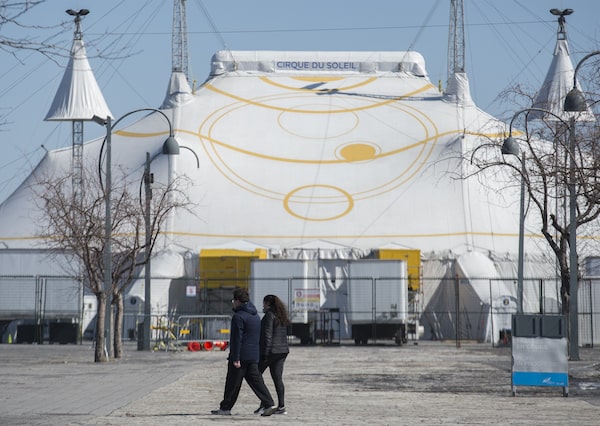
Cirque chairman Mitch Garber said the three existing owners are among the parties expected to be involved in talks on refinancing Cirque.Graham Hughes/The Canadian Press
Cash-strapped Cirque du Soleil has launched a formal search for a deep-pocketed backer to carry the entertainment company until its contortionists and acrobats can return to the stage.
Montreal-based Cirque hired National Bank of Canada last week to advise its board of directors on either selling the company or negotiating a significant cash injection from its existing owners, led by Texas-based private equity fund TPG Capital LP, according to sources involved in the negotiations. The Globe and Mail agreed not to name the sources because they are not authorized to speak for Cirque.
National Bank confirmed on Friday it is working for Cirque, but declined to comment on the project. TPG also declined to comment and Cirque did not reply to inquiries. Cirque launched this process almost two months after it shut down shows in Las Vegas and its touring companies because of the COVID-19 pandemic.
Quebecor Inc. announced last week it made a preliminary offer for Cirque. The telecom and media company said it is willing to put several hundred million dollars into the business, in part to pay 4,700 laid-off employees. To date, Cirque and Quebecor have not held formal talks and Quebecor has not seen the privately owned Cirque’s financial statements.
However, credit rating agency Moody’s said Cirque, which carries US$900-million in debt, faces a US$155-million cash shortfall in coming months if its venues remain closed. Moody’s warned Cirque may burn through even more cash if it is forced to reimburse ticket holders on postponed shows. In a report last month, Moody’s said there is a “high risk of default” at the company, which would mean creditors take control.
“The Cirque is a creative jewel, a great operating company with a broken capital structure,” said Hugues Simard, Quebecor’s chief financial officer. Mr. Simard said while Quebecor would need to do due diligence before committing capital, “we have the balance sheet and skills needed to relaunch Cirque, which I would argue is the world’s best-known Quebec brand.”
TPG owns 55 per cent of Cirque and there are two other shareholders, China-based fund manager Fosun Capital Group with a 25-per-cent stake and Caisse de dépôt et placement du Québec with a 20-per-cent holding. The three financial players put an additional US$50-million into Cirque this month to pay bills that include interest on loans.
In a media interview last week, Cirque chairman Mitch Garber said the three existing owners are among the parties expected to be involved in talks on refinancing Cirque. However, Mr. Garber said “everything is on the table” because of uncertainty over how long the shows will be shut down.
A full-scale auction of Cirque would attract entertainment and gambling companies and private equity funds, according to investment banking sources. Cirque has strong ties to Las Vegas casinos and was scheduled to open a show in Orlando – called Drawn to Life – in partnership with Walt Disney Co. in April. The show was shelved in March.
When audiences are lined up to see Cirque’s Micheal Jackson tribute One or the adult-themed Zumanity in Las Vegas, the franchise is lucrative. Moody’s said Cirque sells US$900-million of tickets annually and the company has previously said it starts making a profit when a venue is 60-per-cent full.
However, the company also borrowed heavily, in part to acquire rivals such as Blue Man Group, acquired in 2017 for what Cirque executives described as “tens of millions of dollars.” Cirque also spent more than US$60-million to develop a Last Vegas show called R.U.N., a gangs-and-motorcycles-themed production developed by filmmaker Robert Rodriguez. The show opened last October to poor reviews and closed in early March, before the widespread COVID-19 shutdown.
Quebecor’s Mr. Simard said based on publicly available information, his company’s “conservative” estimate is Cirque can generate US$100-million a year in earnings before interest, taxes, depreciation and amortization by focusing on its six permanent Las Vegas shows and scaling back travelling tours, which he said would value the business at US$1-billion, at least. “The key to the Cirque is the talent. Our proposal is meant to ensure the performers stay, by giving the company long-term stability,” Mr. Simard said. “I think we all agree that Las Vegas is not going to disappear.”
National Bank executives are dealing with at least three classes of Cirque creditors in this restructuring, with the bulk of the company’s bonds owned by high-yield and distressed debt hedge funds. Managers of these funds have a track record of moving aggressively to seize control of companies that cannot pay their debts.
Moody’s data show the company has a revolving credit line, a first-lien term loan due in 2020 and a second-lien loan due in 2023. Last month, the credit rating agency said Cirque was likely to breach covenants on the revolving credit line; shortly afterward, the existing owners contributed the additional US$50-million.
Your time is valuable. Have the Top Business Headlines newsletter conveniently delivered to your inbox in the morning or evening. Sign up today.